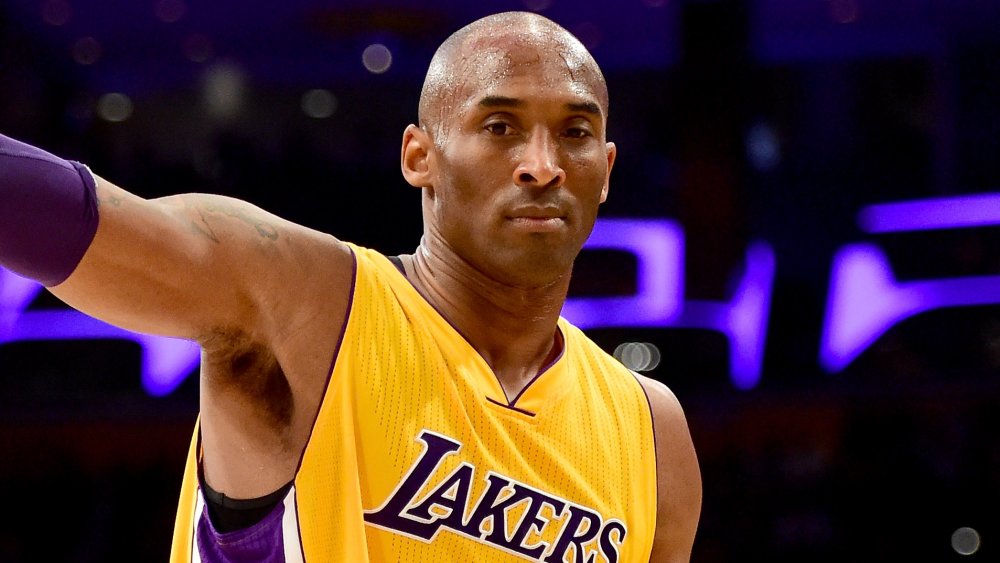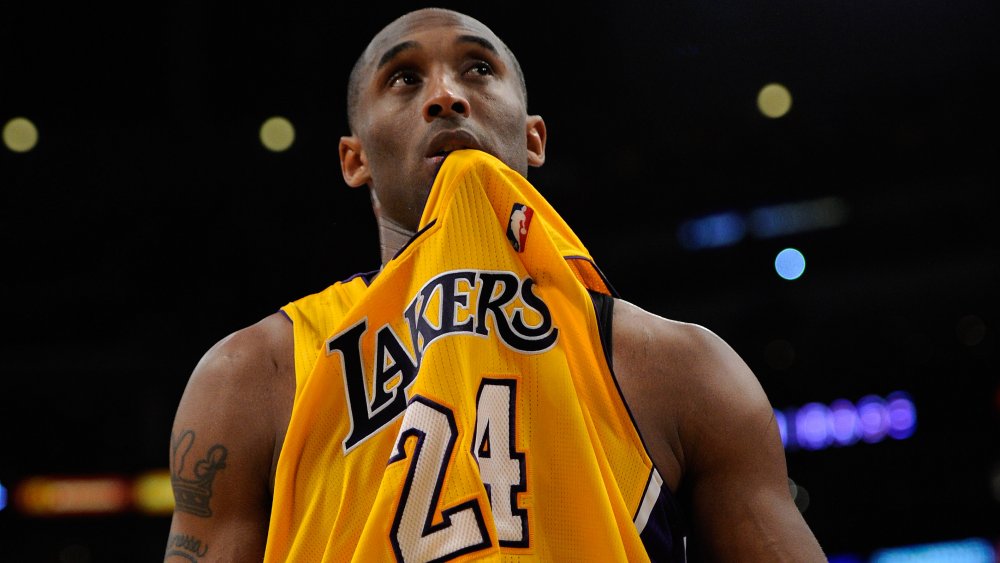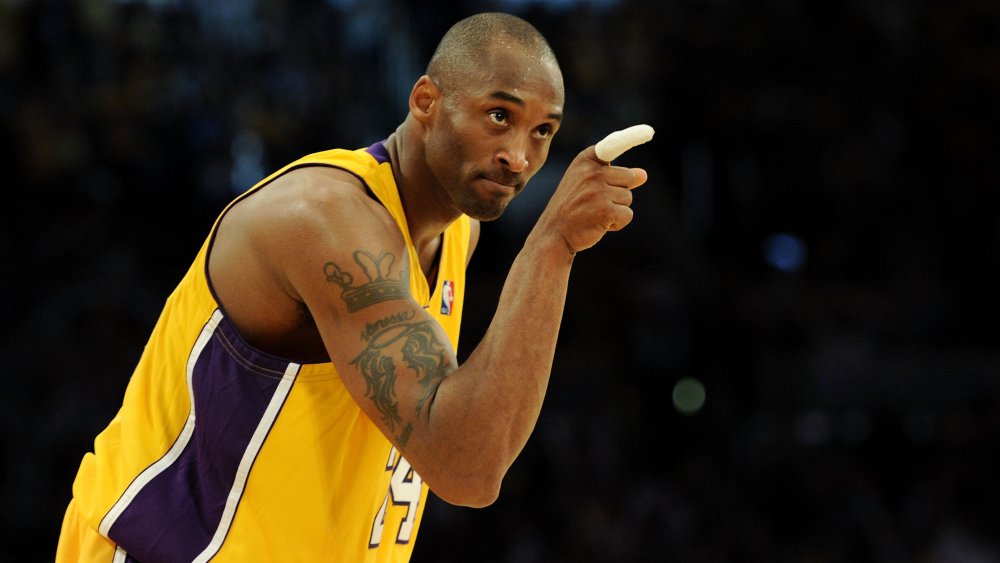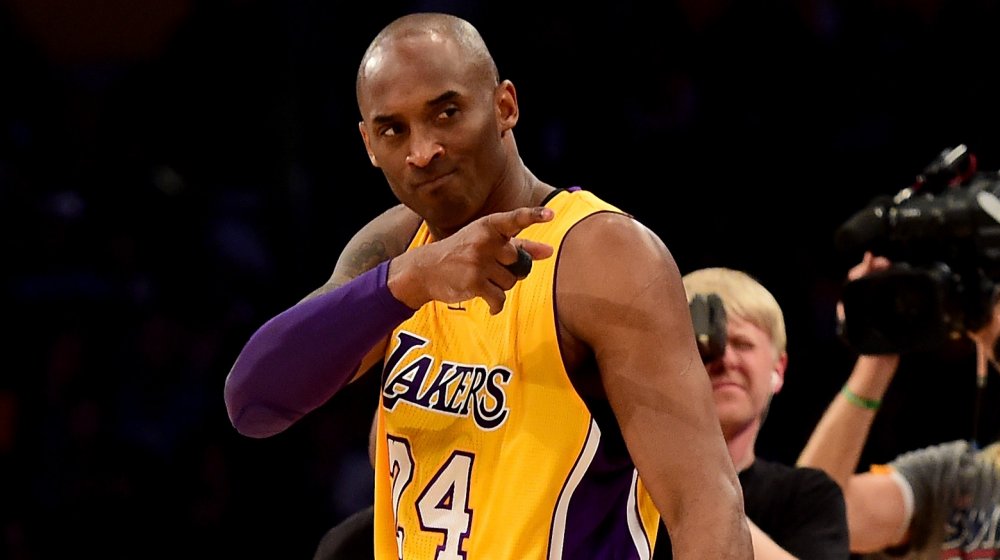The Real Reason Why Kobe Bryant Was Called Black Mamba
Kobe-Wan Kenobi, The Lord of the Rings, The Eighth Wonder of the World — Kobe Bryant was a man of many nicknames. But none was more popular than "Black Mamba."
The former Los Angeles Lakers player brandished himself with the snake-inspired moniker in the early 2000s, and it's stuck with him even after his tragic death on Sunday, January 26, 2020, when he, his teenaged daughter Gianna, and seven other people passed away in a helicopter crash in Calabasas, California. In social media posts remembering the sports legend, fans have used the hashtags #RIPMamba and #MambaOut — nods to Bryant's Black Mamba nickname and the sign-off he'd frequently give.
While hundreds of millions of people across the globe recognize Bryant's face and name, many may not be aware of his Black Mamba epithet, what it actually means, or how it came to be. Here's the real reason why Kobe Bryant was called Black Mamba.
Kobe Bryant created the "Black Mamba" persona to help bring order to his life
In his auto-biographical documentary Muse (via Business Insider), Bryant explained that the Black Mamba moniker came about during a particularly dark period of his life: beginning in 2003, when a 19-year-old woman from Colorado accused Bryant of sexual assault. At the time, Bryant had been married to his wife Vanessa Bryant for just over two years. Though Bryant admitted to having an adulterous encounter with the woman who accused him, he denied assaulting her. In December 2003, Bryant revealed that he was at times "a little bit" scared, and that his mind would wander during games, which impacted his performance.
The lawsuit was ultimately settled out of court, but the experience had a lasting effect on Bryant, who built the "Black Mamba" persona as a way to "separate" himself into two parts and gain some control over his life.
"I went from a person who was at the top of his game, had everything coming, to a year later, having absolutely no idea where life is going or if you are even going to be a part of life as we all know it," Bryant said in the documentary, noting that crowds would shout degrading things at him while he was trying to play. "This place [which] was my refuge is now being bombarded with all kinds of things they would say. I had to separate myself. It felt like there were so many things coming at once. It was just becoming very, very confusing. I had to organize things. So I created the Black Mamba."
How Kobe Bryant chose the black mamba as his nickname inspiration
As Bryant further explained in Muse, embracing the mentality of the Black Mamba — the Mamba Mentality, as it's aptly known — allowed him to become ruthless and powerful the minute he slipped on his Los Angeles Lakers jersey.
"It was just f*** everyone. I'm destroying everybody that steps on the court," he said in Muse. "I had all this pent-up frustration that I just needed to let out. It was an avalanche, man. There was nothing that was going to get in the way. There was nothing that was going to stop me."
It makes sense that Bryant would pick the black mamba as the creature to symbolize his more animalistic side: black mamba snakes, native to the savannas and hills of certain areas of Africa, are described as "lethally venomous," "highly aggressive" when threatened, and among the deadliest snakes in the world (via National Geographic). Bryant himself once explained that black mambas have a near-perfect accuracy rate for striking "at maximum speed, in rapid succession," and that that's "the kind of basketball precision" he was aiming for (via The Los Angeles Times).
As it happens, Quentin Tarantino's Kill Bill also inspired the name of Bryant's alter-ego. Bryant shared with The New Yorker's Ben McGrath in a March 2014 profile that he watched Kill Bill, which follows a woman on a path of revenge after her lover (the titular Bill) and his team of assassins attempt to kill her and her unborn baby, and found it cool that the main character, Uma Thurman's Bride, used the code name "Black Mamba." Bryant revealed that after seeing the film, "I read up on the animal and said, 'Wow, this is pretty awesome.' This is a perfect description of how I would want my game to be."
Making sense of the "Mamba Mentality"
In November 2017, roughly two years after Bryant officially retired from the NBA, he spoke with the organization about what the "Mamba Mentality" actually means.
"It's not an attitude, per se, but it's a way to live, which is just trying to get better every single day," he detailed. "It's not something where you live with a bravado or anything like that. It's just the simplest form of just trying to get better at whatever it is that you're doing [...] That's all my mentality is, is just trying to get better every single day."
Bryant expanded on these thoughts in his book The Mamba Mentality, describing how he channeled his alter ego in constructive ways to encourage his fellow pro basketball players to strive for excellence.
"I always aimed to kill the opposition," wrote Bryant (via The Players' Tribune). "The main thing LeBron [James, Bryant's Team USA Olympics teammate] and I discussed was what constitutes a killer mentality. He watched how I approached every single practice, and I constantly challenged him and the rest of the guys. I remember there was one half when we were messing around. I came into the locker room at half-time and asked the guys — in a less PG manner — what in the hell we were doing. In the second half, LeBron responded in a big way — he came out with a truly dominant mindset. And I've seen him lead that way ever since."
So, there you have it: Kobe Bryant's "Black Mamba" nickname began as an alter ego used to re-focus his mind and evolved into something much bigger and more profound. The late basketball icon (and Academy Award-winning film writer) should also be remembered as such: much more than just a superstar athlete.




